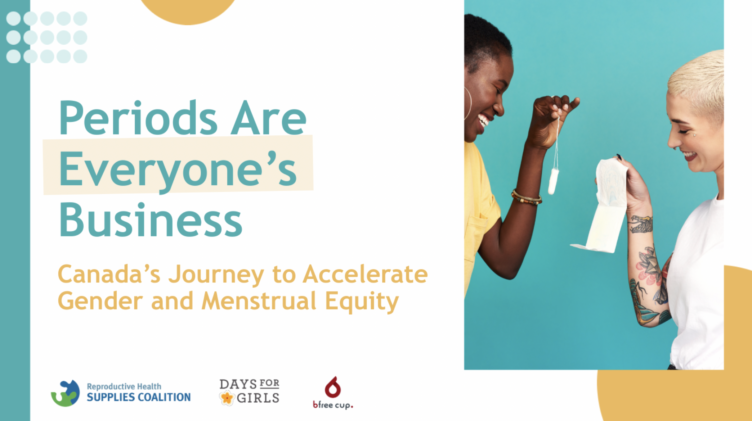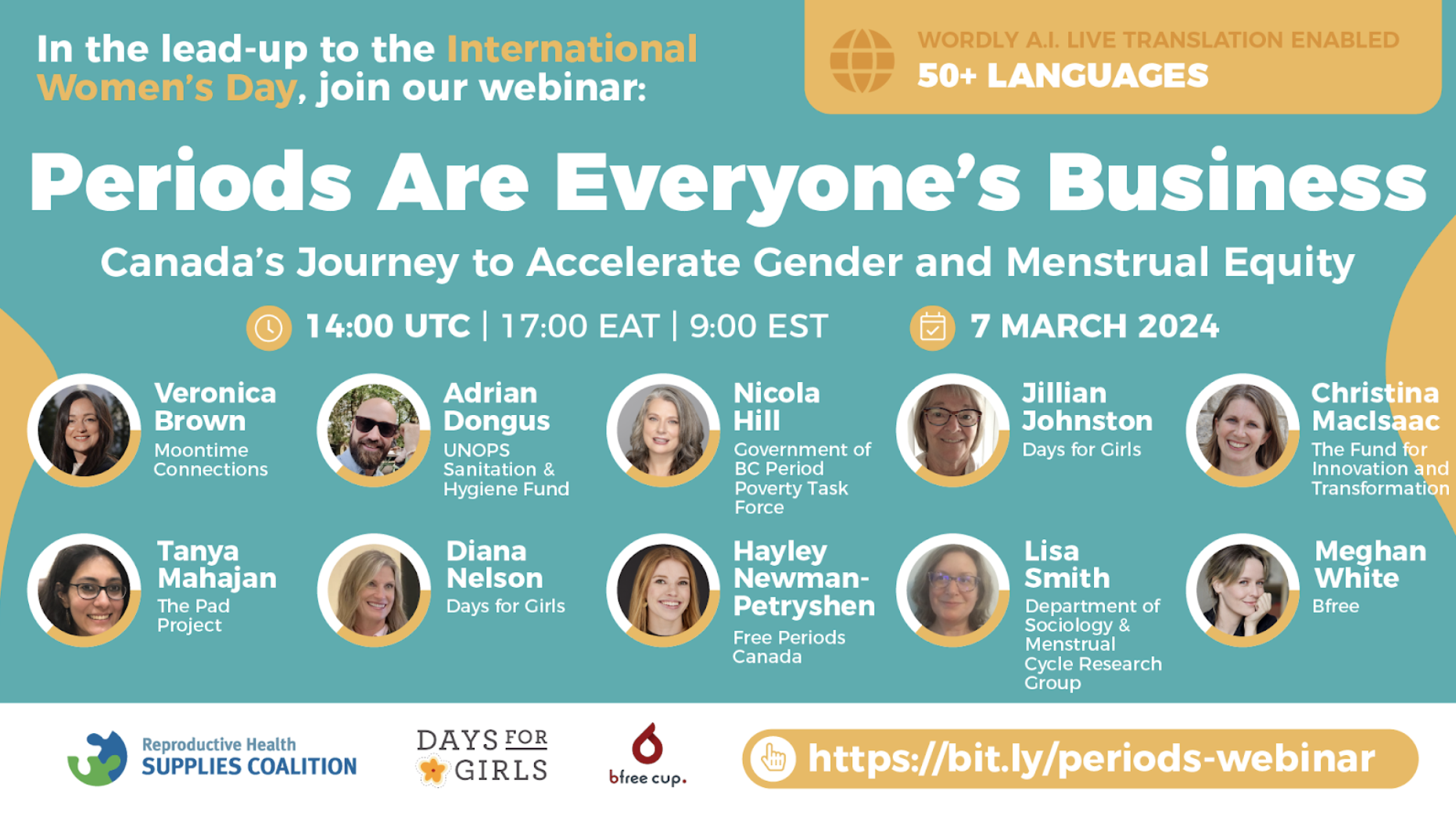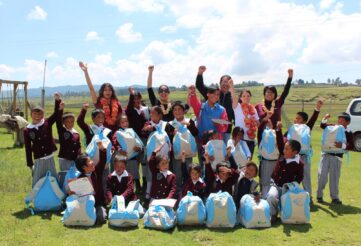Webinar Report: Canada’s Journey to Accelerate Gender and Menstrual Equity

Investing in efforts to advance menstrual health (MH) equality is a crucial step toward reaching gender equality. This is true of all communities and countries, including those that are high-income.
Days for Girls (DfG) knows that addressing period poverty in all contexts is necessary for achieving gender equality, which is why we are so excited to continue sharing resources and research on MH in Canada.
In March, DfG published the Canada MH Country Snapshot, the first of its kind to focus on a high-income country. In conjunction with this, on Thursday, March 7, Days for Girls Reproductive Health Supplies Coalition’s (RHSC) Menstrual Health Supplies Workstream and Bfree Cup hosted a webinar to discuss Canada’s journey in accelerating gender equality and menstrual equity.
The webinar was a perfect lead into International Women’s Day on March 8, which featured the theme Invest in Women: Accelerate Progress for 2024. The theme focused on gender inequalities around the world that are growing in prevalence and which are leaving women and girls behind.
To combat this trend, Canada is leading the way among high-income countries in investment toward greater gender and menstrual equality. In recent years, numerous programs, policies, and initiatives have emerged across Canada to further MH equality, destigmatize menstruation, and reduce period poverty. A wide network of MH stakeholders in Canada, including government, community leaders, grassroots organizations, and the not-for-profit sector are driving these efforts.
Two government representatives joined the webinar to discuss the MH progress Canada is making. Christina MacIsaac, Director of FIT, discussed how the initiative is helping to advance MH in the Global South, and Joanna Baker, Senior Director General of Programs and Regional Operations Branch at Women and Gender Equality Canada (WAGE), shared how MEF is addressing period poverty and providing MH resources to underserved communities.
Key Takeaway from Government Speakers: A cohesive advocacy framework in Canada is required for large-scale MH support – A cohesive framework that synthesizes the support, involvement, and resources across the many MH stakeholders in Canada is needed for larger-scale MH support and the long-term success of MH efforts.
We strive toward a world in which women and gender-diverse people who menstruate can easily access the period products of their choice in an environment free of shame and stigma.
– Joanna Baker
Most notably, the Canadian government is directing its MH-focused efforts through two initiatives, one global and one domestic. The global initiative, the Fund for Innovation and Transformation (FIT), supports small and medium-sized organizations (SMOs) testing innovative solutions that advance gender equality in the Global South.
The domestic initiative, the Menstrual Equity Fund Pilot (MEF), focuses on addressing barriers related to MH equality within Canada. The pilot project has sought to increase MH product access, provide MH education, and deconstruct stigma around menstruation. Through the pilot, MEF helped organize the distribution of free menstrual products to low-income communities and partnered with grassroots organizations to scale up MH awareness activities, education, and destigmatization.
In addition to representatives from FIT and WAGE, the webinar featured an incredible panel of MH experts from across Canada who spoke to the different facets of MH conditions in Canada. The panelists emphasized two central elements that are necessary to maintain progress toward MH equality. First, is the importance of data in accelerating MH education and supply access, and second is the importance of MH market development.
Key Takeaways from the Panel Discussion
- Enhancing the role data plays in advancing menstrual equality – Investing in MH data, especially inclusive and intersectional data, is crucial for advancing menstrual equality. The availability of MH data can enhance MH stakeholders’ efforts, while its absence can be a significant barrier to understanding the breadth and depth of MH issues.
- Building trust and relationships with diverse communities – Indigenous menstruators, LGBTQIA+ individuals, and other diverse communities across Canada often face additional, unique barriers to MH access. Investing in relationship development and trust-building with diverse and often underserved communities is essential for realizing menstrual equity.
Looking Ahead
Improving the MH landscape in a high-income country requires the involvement of many MH stakeholders and their long-term commitment to the objective. Both domestically and internationally, Canada is demonstrating its commitment to furthering MH through an incredible range of programming, initiatives, and public and private support.
Through building supportive frameworks, emphasizing the importance of data, providing comprehensive MH education, and increasing the choice of MH products, Canada is taking the necessary steps toward achieving gender and menstrual equality. Through increased advocacy and awareness of these efforts, Canada can set an example for other high-income countries of the importance of investing in women, girls, and people who menstruate.
Watch the Webinar here.
Read the full Webinar Report here.
Read more about the MH progress Canada is making in the Canada MH Country Snapshot.
Panelists:
- Tanya Mahajan, Co-founder of Menstrual Health Action for Impact (MHAi) & Co-Chair of the RHSC MH Supplies Workstream
- Hayley Newman-Petryshen, Co-Director of Monthly Dignity & Project Coordinator for Free Periods Canada
- Nikki Hill, Founder of United Way British Columbia Period Promise
- Veronica Brown, Ontario Chapter Lead & Education Co-Director for Moon Time Connections
- Dr. Lisa Smith, Faculty Member & Coordinator of the Menstrual Cycle Research Group at Douglas College
- Jess Strait, Advocacy Specialist & Data Systems Manager at Days for Girls
- Meghan White, Digital Marketing Manager at Women’s Global Health Innovations & Founder of Period Packs
- Adrian Dongus, Menstrual Hygiene Markets Specialist at The Sanitation and Hygiene Fund
- Diana Nelson, Global Advocacy Director, Days for Girls (Moderator)










